|
|
|
Sort Order |
|
|
|
Items / Page
|
|
|
|
|
|
|
| Srl | Item |
| 1 |
ID:
166503


|
|
|
|
|
| Summary/Abstract |
Community renewable energy initiatives are increasingly recognized as important actors to trigger citizen investments in renewable energy facilities. Little is known, however, about the factors that determine the size of financial investments made by community renewable energy members. To address this gap, this paper presents a multivariate econometric analysis of the economic, social, environmental and institutional determinants of the size of investments in community renewable energy. It relies on a large-scale survey of 4061 members of two renewable energy cooperatives located in Flanders, in the northern part of Belgium. Results show that the return on investment is the most important determinant for members of large communities of interest, while environmental, social and other non-economic drivers tend to dominate financial motives for members of smaller communities of place. The presence of other cooperative members in close social networks plays a particularly important role in the latter kind of communities, highlighting the strength of social interactions as a driver for investments. These results can help policy-makers to design more adapted policy measures for fostering financial investments at the community level, and project developers to tailor segmented communication strategies about the goals and benefits of projects.
|
|
|
|
|
|
|
|
|
|
|
|
|
|
|
|
| 2 |
ID:
075056
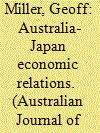

|
|
|
|
|
| Publication |
2006.
|
| Summary/Abstract |
The NARA Treaty looked to a strengthened Australia-Japan relationship, which foreign ministers of both countries celebrated this year. Events of the mid 1980s, however, demonstrated how an adverse turn in economic circumstances can stress even a strong bilateral relationship. The two countries were then at opposite points in their economic cycles, Japan almost too successful, with the high yen putting pressure on Japan's export industries, steel in particular. Seeking to reduce costs, the steel mills transferred pressure to their Australian suppliers of coal and iron ore, through reductions in prices and volumes. This was unwelcome to an Australian government coping with a recession and worried about balance of payments and unemployment, and led to concerns about equal treatment. Although the minerals trade returned to normal relatively quickly, ambitious investment projects aimed at enhancing the economic relationship did not materialise.
|
|
|
|
|
|
|
|
|
|
|
|
|
|
|
|
| 3 |
ID:
041088


|
|
|
|
|
| Publication |
Washington, D C, Brooking Institution, 1991.
|
| Description |
xxvii, 341p.
|
| Standard Number |
0007-2303
|
|
|
|
|
|
|
|
|
|
|
|
Copies: C:1/I:0,R:0,Q:0
Circulation
| Accession# | Call# | Current Location | Status | Policy | Location |
| 033106 | 330/BRA 033106 | Main | On Shelf | General | |
|
|
|
|
| 4 |
ID:
087648
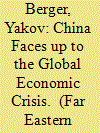

|
|
|
|
|
| Publication |
2009.
|
| Summary/Abstract |
China's growing involvement in the global economy and politics brings it considerable benefits. China gets unrestricted access to world markets for goods and services to supply to, to natural resources and fuels, new technologies and modern managerial know-how, and to international organizations that adopt decisions critical to China's development. All these benefits are acquired at the cost of the country's rising dependence on worldwide developments, market ups and downs, and even worldwide cataclysms.1 The current global financial and economic crisis shows this beyond a shadow of doubt. Accordingly, debates are erupting now and then in China about the balance of gain and loss; about the best way to use the advantages of being involved in globalization and to avoid its most destructive consequences; and also about what is needed to maintain the country's economic and political sovereignty and security without fencing itself off from the rest of the world, but instead take the position of a responsible participant and agent of world history.
Crises in the free-market economy that China is determined to build are certainly unavoidable. The key issue is then to realize that the market, the principal advantages of which are higher competitiveness of enterprises, the state itself, and individuals, cannot correct its inevitable deficiencies all by itself. While promoting a free-market economy, therefore, China is seeking to keep very power-
|
|
|
|
|
|
|
|
|
|
|
|
|
|
|
|
| 5 |
ID:
155331


|
|
|
|
|
| Summary/Abstract |
This article examines the economic influence of Chinese living abroad (huaqiao) on the development of the 21st Century Maritime Silk Road on PRC territory. The author analyzes the territorial structure of investments and the branch structure of the huaqiao companies in the region of the Bohai Bay ring, the Yangtze River Delta, southern maritime regions and the southern shore of the PRC western regions through which the Maritime Silk Road will pass.
|
|
|
|
|
|
|
|
|
|
|
|
|
|
|
|
| 6 |
ID:
166730
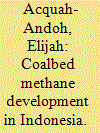

|
|
|
|
|
| Summary/Abstract |
Due to increasing demand for natural gas in Indonesia, the Government now promotes exploration for coalbed methane (CBM). Currently, Indonesia has 453 trillion cubic feet (TCF) of CBM reserves. However, CBM development in the country is still in the exploration phase, with significant under-investment. To attract investors, a tailored Production Sharing Contracts (PSC) regime is required. Based on a combination of Factor Analysis (FA), Discounted Cash Flows (DCF) and Parameter Sensitivity Analysis, the research explores an optimal scenario of a company's share of revenue that optimised CBM development contracts. We find that a combination of 5 years straight line depreciation (SLD), 5% First Tranche Petroleum (FTP), 78% Contractor Share (CS) and 35% income tax best spreads the risk of CBM development and exploitation between the government and the contractor. This combination is a more suitable PSC regime for developing CBM in an early stage of the industry. Therefore, the Government must cede some taxes during exploration to incentivise CBM development. Three PSCs regimes are thus required to fully develop and exploit CBM, including exploration, transitional and exploitation phase PSCs which better match contractor risks and returns and ensure reasonable certainty of contractor cost recovery.
|
|
|
|
|
|
|
|
|
|
|
|
|
|
|
|
| 7 |
ID:
175942


|
|
|
|
|
| Summary/Abstract |
The fuel and energy sector (FES) plays an important role in modern international relations. One of the examples of active cooperation in the FES in the early 21st century is the dialogue between China and Great Britain, which is based on an extensive system of agreements and joint projects. The authorities of the states render assistance to national fuel and energy companies in drawing up the contours of the energy alliance. At the same time, the Chinese side, using its accumulated potential, plays an increasingly important role in bilateral relations, acting as a major buyer of energy resources, a donor of modern technologies, and a promising investor.
|
|
|
|
|
|
|
|
|
|
|
|
|
|
|
|
| 8 |
ID:
188571
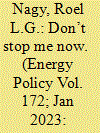

|
|
|
|
|
| Summary/Abstract |
Once a subsidy scheme is close to reaching its goal or loses political support, it may be terminated. An important question for policy makers is how to minimize the negative impact of the risk of subsidy termination on industrial investment. We assume the social planner aims to increase capacity and welfare and uses a subsidy, which has an uncertain lifetime, for the purpose. We examine a monopolist supplying an uncertain demand, faced with the option to expand capacity by irreversibly investing in small increments. We find that the firm installs capacity expansions sooner and, consequently, installs a larger capacity than a firm without a subsidy. A firm’s total investment during the subsidy’s lifetime increases with both the subsidy size and the likelihood of subsidy withdrawal. However, this happens at the cost of less investment directly after the subsidy has been retracted. The optimal subsidy size strongly depends on the point in time at which the social planner aims to maximize the welfare — the further into the future, the larger the welfare optimal subsidy. Furthermore, the welfare optimal subsidy size strongly depends on the social planner’s discretion over adjustments to the subsidy size.
|
|
|
|
|
|
|
|
|
|
|
|
|
|
|
|
| 9 |
ID:
150915


|
|
|
|
|
| Summary/Abstract |
Community-based renewable energy initiatives may be important actors in the transition toward low-carbon energy systems. In turn, stimulating investments in renewable energy production at the community level requires a better understanding of investors' motives. This paper aims to study the heterogeneity of motivations that drive individuals to participate in community renewable energy projects and the underlying explanatory factors behind this, as well as the implications for their level of engagement in initiatives. Based on quantitative data from an original survey conducted with two renewable energy cooperatives in Flanders, the statistical analysis shows that cooperative members should not be considered as one homogeneous group. Several categories of members with different motives and levels of engagement can be distinguished. This heterogeneity is explained by contrasts in terms of institutional settings, spatial patterns and attitudes to the diffusion of institutional innovations. Regarding policy implications, the findings suggest that this heterogeneity should be taken into account in designing more effective supporting policies to stimulate investments at the community level. The activation of social norms is also shown to be a promising mechanism for triggering investment decisions, although the implications of its interplay with economic incentives should be further explored.
|
|
|
|
|
|
|
|
|
|
|
|
|
|
|
|
| 10 |
ID:
125413


|
|
|
|
|
| Publication |
2013.
|
| Summary/Abstract |
Climate change is a global issue, but actions to mitigate its development are regional. Europe has taken the leadership in the carbon emission policy by introducing the Emissions Trading Scheme (EU ETS), formerly regulated by Directive 2003/87/EC and since 2013 by Directive 2009/29/EC. This new Directive imposes a full auctioning system for allocating CO2 allowances to the power sector and encourages the use of renewable energy sources.
We investigate the economic impacts of the EU ETS on the Italian electricity market using a power generation expansion model. We adopt a technological representation of the energy market that also accounts for power exchanges with foreign countries and we assume that generators operate in different zones connected by interconnections with limited capacity. We study both an oligopolistic and a perfectly competitive behavior of Italian generators and we compare the corresponding outcomes under different EU ETS scenarios. Our analysis shows that, in perfect competition, generators generally invest more than in an oligopolistic framework, but in both market configurations, investments in Italy are mainly concentrated in fossil-fired plants, especially in 2020. This happens also when incentives are given to renewables.
The developed models are implemented as complementarity problems and solved in GAMS using the PATH solver.
|
|
|
|
|
|
|
|
|
|
|
|
|
|
|
|
| 11 |
ID:
161055


|
|
|
|
|
| Summary/Abstract |
The Belt and Road Initiative (BRI), originally aimed at domestic economic development, has turned into an umbrella bringing together China’s ambitious projects to shape a new order in Eurasia, which directly influences Europe. The authors represent both Chinese and European perspectives on this issue. The BRI has become a mechanism to represent China abroad as well as a tool to ensure China’s competitive advantage in the world trade.This also has an impact on the entire trade system redirecting trade flows and making countries to compete for investments, which alters the existing order and each country’s place in this order. Buying shares of Italian strategic national companies, gaining control over ports and terminals along the BRI sea route, for example, the port of Piraeus, and other investments recently made by China force European countries to adapt its economic strategies to new conditions.
|
|
|
|
|
|
|
|
|
|
|
|
|
|
|
|
| 12 |
ID:
112734
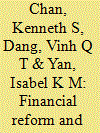

|
|
|
|
|
| Publication |
2012.
|
| Summary/Abstract |
This paper examines the impact of recent financial reforms in China on the financing constraints and investment of publicly-listed Chinese firms. Two continuous indices are constructed to measure the evolution and intensity of financial reforms: a financial liberalization index and a capital control index. Dynamic panel GMM method is used to estimate firms' financing constraints in an Euler-equation investment model. Based on panel data of listed firms for 1996-2007, we find that large firms face no credit constraints and smaller firms display significant constraints. However, the sensitivity of large firms' investment to their cash holdings is heightened as more financial reforms take place. It appears that reforms that gradually eliminate preferential treatments to large firms, primarily state-owned enterprises (SOEs) in China, have subjected these firms' investment decisions to stricter market-based discipline and therefore raised their financing constraints. No significant change in the financing constraint is detected for smaller firms in China. This is interpreted as financial reform in China has not been substantial enough for its benefits to reach smaller firms.
|
|
|
|
|
|
|
|
|
|
|
|
|
|
|
|
| 13 |
ID:
156455


|
|
|
|
|
| Summary/Abstract |
This study investigates the influence of the financial system on firms' investment efficiency in China. For this purpose, we employ country level data of capital markets and financial institutions along with financial data from 2797 Chinese firms in the period from 1998 to 2015. The firms are priori classified into four groups, by high and low values of financial constraints and agency problems. Results show that financial development influences firms' investments positively either directly or by reducing cash flow sensitivity. The impact remains the same for all types of firms. Moreover, the financial structure has an impact on investment efficiency of firms; this result also remains the same even after controlling levels of financial development. Study contributes that capital market based financial structure impacts investment decisions by reducing financing constraints and agency issue due to its strong monitoring ability.
|
|
|
|
|
|
|
|
|
|
|
|
|
|
|
|
| 14 |
ID:
166570


|
|
|
|
|
| Summary/Abstract |
Modern electricity markets are characterized by an increasing share of renewable electricity generation. This growth in the share of renewables yields a highly intermittent generation structure. To efficiently integrate renewable electricity generation into our energy system, flexibility options ranging from storage facilities to demand-side management will play a major role in the low-carbon energy transformation. Keeping up with the growing demand for flexibility, energy law must reduce current investment obstacles for flexibility options and establish a climate for future investments with sufficient incentives for private investors. By taking up perspectives from different disciplines, this paper summarizes current investment barriers, presents an overview of the existing legal energy investment framework of the EU and Germany, and elaborates on challenges of the presented legislation. As we argue, a well-designed energy market legislation will be one of the keys to a successful energy transition. However, policy makers will have to (i) lower investment uncertainty for private investors, (ii) avoid a distortion of energy investment law towards specific flexibility options and technologies, and (iii) reduce the complexity of the current legislation.
|
|
|
|
|
|
|
|
|
|
|
|
|
|
|
|
| 15 |
ID:
156066
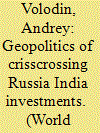

|
|
|
|
|
| Summary/Abstract |
Andrey Volodin provides an overview of crisscrossing Russia–India investments and demonstrates that this is a relatively new phenomenon in the history of their relations. He also suggests some policy initiatives which could pave the way for increasing trade and enhancing the competitive advantages of both countries internationally.
|
|
|
|
|
|
|
|
|
|
|
|
|
|
|
|
| 16 |
ID:
032608


|
|
|
|
|
| Publication |
London, Charles Knight, 1973.
|
| Description |
vii, 123p
|
| Standard Number |
0853141649
|
|
|
|
|
|
|
|
|
|
|
|
Copies: C:1/I:0,R:0,Q:0
Circulation
| Accession# | Call# | Current Location | Status | Policy | Location |
| 012847 | 332.673091724/ALL 012847 | Main | On Shelf | General | |
|
|
|
|
| 17 |
ID:
072045


|
|
|
| 18 |
ID:
111058


|
|
|
|
|
| Publication |
2012.
|
| Summary/Abstract |
Investments in renewable energy (RE) technologies are regarded with increasing interest as an effective means to stimulate growth and accelerate the recovery from the recent financial crisis. Yet, despite their appeal, and the numerous policies implemented to promote these technologies, the diffusion of RE projects remains somehow below expectations. This limited penetration is also due to a lack of appropriate financing and to a certain reluctance to invest in these technologies. In order to shed light on this phenomenon, in this paper we examine the decision making process underlying investments in RE technologies. We propose and test a conceptual model that examines the structural and behavioural factors affecting the investors decisions as well as the relationship between RE investments and portfolio performance. Applying econometric techniques on primary data collected from a sample of European investors, we study how the investors' a-priori beliefs, their preferences over policy instruments and their attitude toward technological risk affect the likelihood of investing in RE projects. We also demonstrate that portfolio performance increases with an increase of the RE share in the portfolio. Implications for scholars, investors, technology managers and policy makers are derived and discussed.
|
|
|
|
|
|
|
|
|
|
|
|
|
|
|
|
| 19 |
ID:
121058


|
|
|
|
|
| Publication |
2013.
|
| Summary/Abstract |
The GCC States are very important for India due to energy security, trade, investments, food security, and Indian workers and for broader security and stability in the region. But from a long term perspective, India should develop close relations with at least three strategically important West Asian states: Oman, Iran and Egypt. This article forcefully argues why India must focus on these States keeping in mind historical, cultural, political, economic and strategic factors.
|
|
|
|
|
|
|
|
|
|
|
|
|
|
|
|
| 20 |
ID:
116038


|
|
|
|
|
|
|
|